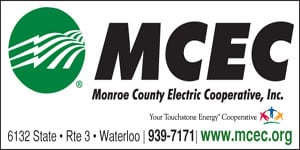Columbia OKs budget, rate increases
Columbia water and sewer customers are facing a rate increase of 10 percent, but the money is not going down the drain.
During the Columbia City Council meeting Monday night, City Administrator Doug Brimm said the increase in rates will add about $9.19 per month to a utility bill for the average residential customer.
He added the sewer rate increase is intended to save customers money in the long run.
“There is no secret that the city must replace its existing sewage treatment plant by the year 2035,” Brimm began.
With a current estimated price tag of $25 million, Brimm explained the city can save money by getting a head start, and extra revenue required to begin the process is one driver of the rate increase.
Brimm said Columbia will “ideally” begin design and engineering for the project within 18 months in hopes of bringing the new plant online “well in advance” of a 2035 deadline established by the Illinois Environmental Protection Agency.
By beginning preliminary work now, Brimm argued the city will save money by avoiding a common practice of rolling engineering costs into the overall construction price – eliminating interest payments on a needed service and avoiding potentially higher future costs.
“This rate increase ensures the city has the adequate funding available to facilitate that approach,” Brimm said.
Furthermore, Brimm pointed out even with the 10 percent increase, the city’s sewer operations fund – even without debt service for the new plant – will be depleted after Fiscal Year 2040 based on past trends and future projections.
On a positive note, Brimm reported the city will transfer just over $340,000 into the city’s sewer operations fund at the end of the current fiscal year – nearly double the projected amount.
While the need for a sewer rate increase is evident, the water rate increase is due to uncertainty regarding expiration in 2028 of Columbia’s current contract with water provider Illinois American Water.
The 10 percent water rate increase includes a 4.96 percent increase recently announced by Illinois American, which would have “negated” the 5 percent increase proposed during an April 13 budget workshop.
Brimm told the Republic-Times on Tuesday the city is seeking to build a reserve against anticipated costs when the current contract expires.
If a new contract agreement with Illinois American Water were reached, Brimm suggested it would likely include a significant rate increase.
He added the city council will determine the most prudent course of action when the time comes, which could include working with nearby municipalities to create a shared water system or seeking a feasible method to connect to a Missouri water supply.
Brimm noted the current increase in both water and sewer rates “only buys us time,” and future rate increases are inevitable.
In order to get a better idea of how to prepare for future budgets and spending practices, Columbia will be working on a financial policy manual in the coming months to enable aldermen to direct staff on “appropriate fund balance percentages” going forward.
City garbage and recycling will also increase 5 percent in response to updated rates by provider Reliable Sanitation Services.
Aldermen voted unanimously to approve the fees and charges for the upcoming fiscal year.
Columbia also passed its budget for Fiscal Year 2024, which takes effect May 1.
“Overall, the city is in great financial shape, even though the city’s budget is operating at a planned deficit of $2.88 million, which is solely attributed to the planned projects in the capital development fund and the draw-down of the remaining funds in the Admiral Parkway Tax Increment Financing fund,” Brimm said.
The city is expected to generate $17.95 million in revenue against $20.7 million in expected expenses.
Some of the expenses coming out of this year’s budget had been included in past budgets but were delayed for various reasons, resulting in the apparent deficit for FY24, Brimm explained.
Upcoming projects financed through the capital development and TIF funds include water/sewer extensions, a Bolm-Schuhkraft Park “safety connector” and Quarry Road connector trail, Carl Street bridge reconstruction and construction on Valmeyer and Ghent roads.
The general fund, which Brimm has described as the best indicator of the city’s financial position, is expected to end FY24 with a surplus of $174,000 and an ending fund balance of $3.3 million.
The city’s corporate fund will see a 1.6 percent increase despite an average line item reduction of 5.23 percent due in part to an 11.05 percent increase – just over $500,000 – in the transfer amount to the city’s ambulance fund.
Part of the increase will fund EMS equipment upgrades, vehicle fuel cost increases and maintenance contracts.
The city’s police fund will see a 3.03 percent decrease from FY23 in the enforcement category but a projected 16.83 percent increase on the dispatch side due to two current telecommunicator position vacancies which are expected to be filled.
With the comprehensive planning process wrapping up later this year, the community development budget will decrease 9.22 percent.
The community development computer and equipment line will increase by almost 170 percent.
There is $22,400 budgeted for the purchase of EnerGov, a system which will make it possible to apply for building permits and similar applications online.
The city’s park fund shows a projected surplus of over $1 million, as many projects are in a “holding pattern” until the comprehensive plan process is finalized.
Columbia Mayor Bob Hill thanked Brimm, Columbia Director of Finance Linda Sharp and department heads for their work in delivering a sound budget.
“I know it’s difficult. We had to trim down almost $800,000 off the budget this year, so it was some hard decisions that had to be made,” Hill said.
He added “unfunded mandates that come out of Springfield are just killing cities, and we’re not exempt from that. We’re going to have to work with a lot less and do a lot more with the little we do have.”
Hill also thanked aldermen and staff for their work to ready this budget.
A copy of the approved budget will be available at columbiaillinois.com/508/Budget-Documents.
In other action, the council approved an ordinance which updates recently-passed solar energy regulations for properties in Columbia.
Columbia Director of Community Development Scott Dunakey explained the city had been contacted with instances in which the previously established guidelines were not realistic.
One situation Dunakey described involved setback conflicts for roof-mounted solar systems on buildings which were built prior to Columbia establishing current property setback requirements. In such cases, installation would have required a separate special use application.
The other situation pertained to ground-mounted systems on larger parcels. In the original code, solar panels are restricted from being located in the “front” of a property.
Dunakey pointed out that there are instances in which a house is located at the corner of a parcel, thereby making it impossible to place solar equipment in the rear of the property.
Dunakey also noted many of the larger parcels are far enough away from neighboring properties to allow exception to the rule.
Aldermen voted unanimously to approve the amendments.
The next city council meeting is May 1, during which newcomer Lauren Nobbe will be seated, replacing outgoing Ward II Alderman Kevin Martens.








